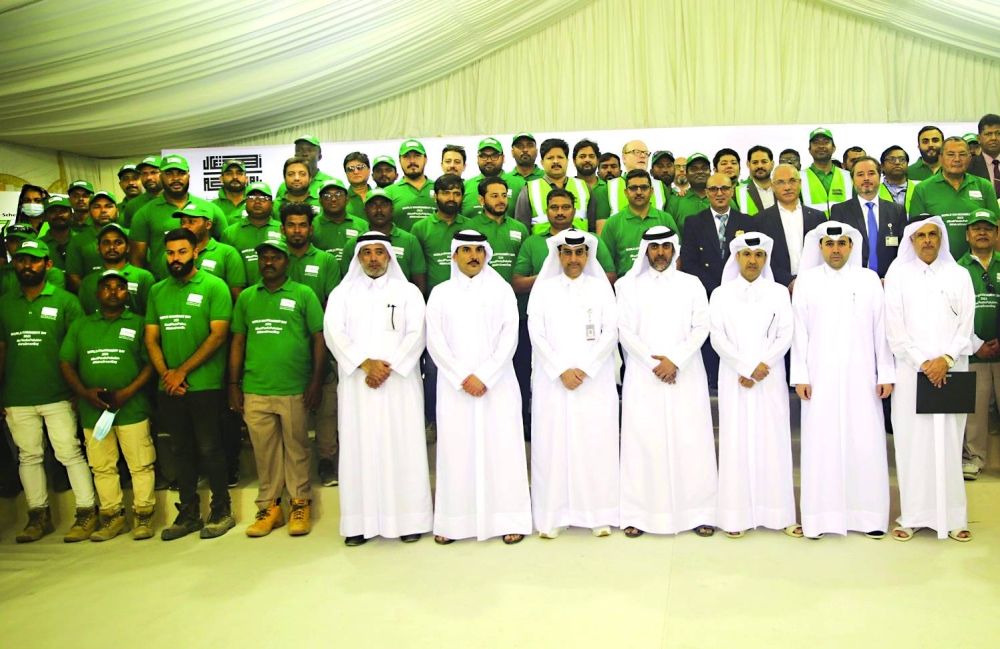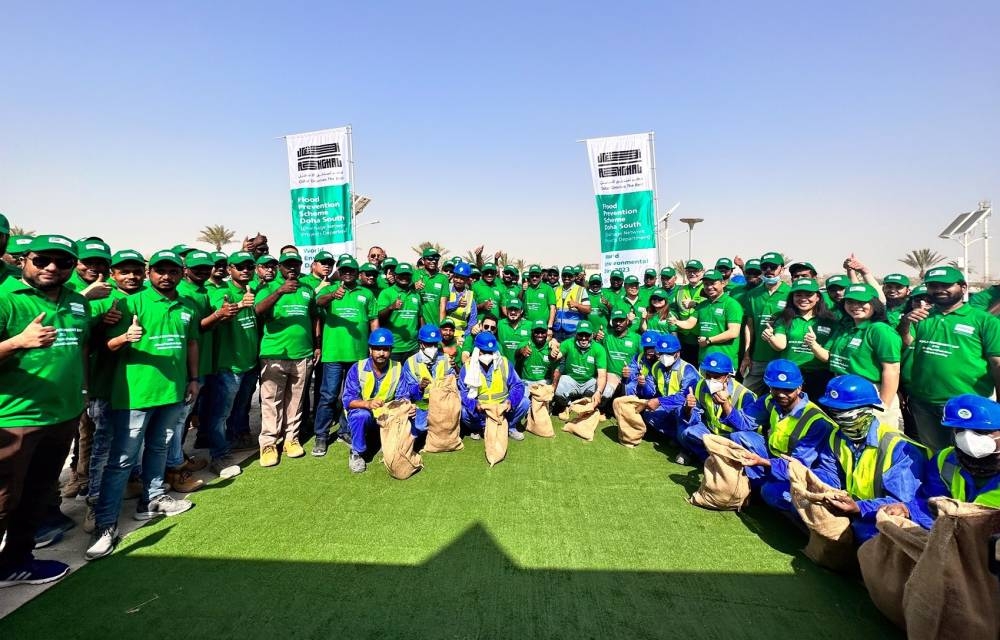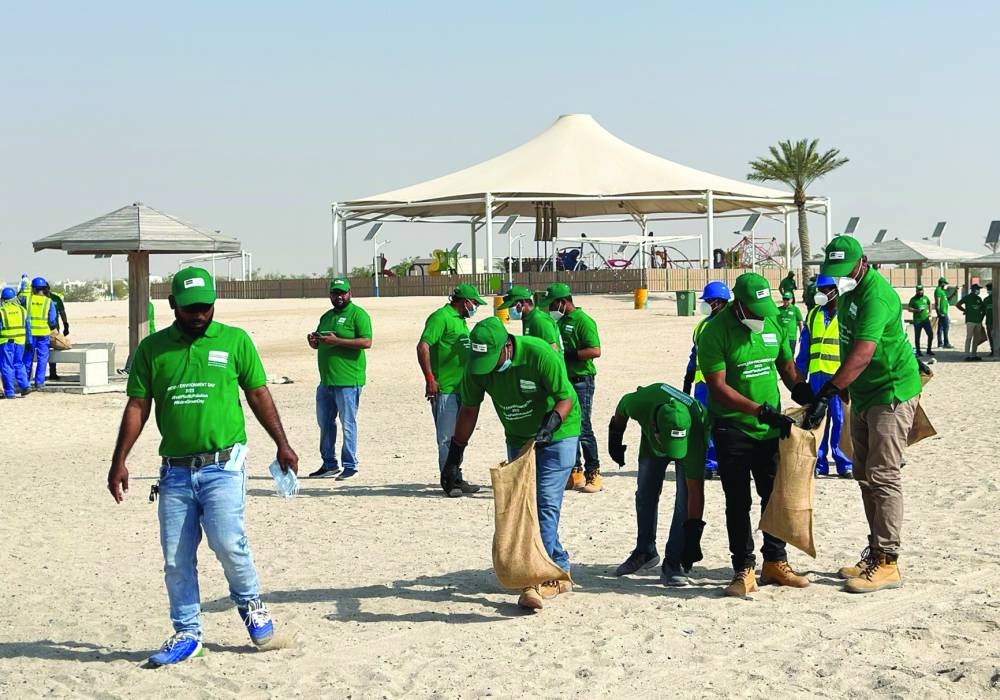The Public Works Authority (Ashghal) organised an event on the World Environment Day 2023, Monday.
Ashghal also celebrated the completion of work on stormwater networks - part of the Flood Prevention Scheme in Doha South areas of the Drainage Network Projects Department - which aims to provide a solution for stormwater accumulation in various areas, including Al Wakra.
At the Ashghal event to mark the World Environment Day more than 100 volunteers and environmental activists participated, along with the project team, as they cleaned Al Wakra Beach off waste and harmful plastic materials.
During the event, the project team also participated in removing construction waste, temporary pumping systems and pipes that were used during the rainy season, in addition to leveling the beach ground and extending a layer of clean sand.
On the occasion, Ashghal Drainage Networks Projects Department Manager, Khalid Saif al-Khayareen, stressed the authority's commitment to preserving the environment during the implementation of infrastructure development projects in the country.
Ashghal is committed to contributing to the Qatar National Vision 2030 in the field of environmental protection, in cooperation with all entities in Qatar, al-Khayareen said.
The participation of the large number of volunteers in cleaning the Al Wakra Beach reflects the increasing awareness of the importance of protecting the environment among members of society, he said.
Al-Khayareen stressed the importance of co-operation between the Public Works Authority and the Ministry of Municipality represented by the Al Wakra Municipality, which helped to overcome challenges the work team faced during the project implementation phases.
The authority, represented by Khalid Saif al-Khayareen, honoured the participating guests as well as the Flood Prevention Scheme Projects work team on the part of Ashghal, the main implementation contractor, Hamad Bin Khalid Contracting Company, and the consultant company supervising the project, Parsons International Limited, in recognition of their contribution to environmental protection and community participation in the Al Wakra area, in addition to providing a safe work environment in the project which resulted in achieving 7,000,000 man-hours without lost-time-injuries (LTI).
Regarding the Flood Prevention Scheme project, Drainage Networks Projects Department Assistant Manager Khalid al-Qatami said the implementation of the third phase began in April 2020 with the aim of providing practical solutions to the problems of stormwater accumulation in more than 35 areas north and south of Doha, including Al-Wakra area, which will contribute to meeting the needs of the population and improving the quality of life and environmental conditions there.
As for the Al Wakra area, Khalid al-Qatami explained that the design process took into account the volume of rains expected in Al Wakra area and its vital sites such as the Al-Wakra Main Road and the areas surrounding Al Janoub Stadium, Al-Wakra General Hospital, and some residential areas, in addition to the old Al-Wakra Souq and the surrounding area. The ground tank is designed with a capacity of 40,000 cubic metres.
Khalid al-Qatami pointed out that the main stormwater drainage networks with a total length of 75km have been completed, of which 19km of networks are in Al Wakra. These networks cover 108 flood control points in the north and south of Doha.
The Flood Prevention Scheme — Phase 3 had effective societal and environmental contributions.
Works implemented during various stages of the project contributed to the recycling of 470,000 tonnes of backfills materials, in addition to the recycling of more than 29,000 cubic metres of scraped asphalt from existing roads prior to excavation works, which were reused in paving temporary roads and traffic diversions at the project site, thereby reducing dependence on materials imported from abroad.
On the other hand, water resources resulting from the groundwater dewatering works were used after being treated by primary methods and used in dust and sand suppression during the leveling of the backfilling materials, instead of using drinking water.
These works have contributed to reducing the carbon footprint of the project by a total of 2,500 tonnes of carbon dioxide in Al Wakra area alone, equivalent to the amount of harmful emissions absorbed by more than 78,000 mature trees over a period of one year.
Ashghal continues its efforts to incorporate sustainability and environmental protection in its projects and create a balance between economic growth and environment preservation, as part of its commitment to play a vital role in contributing to the achievement of Qatar's strategic objectives, in line with Qatar National Vision 2030.
Qatar
Ashghal completes stormwater networks in Doha South areas
Project aims to provide solution for stormwater accumulation in various areas, including Al Wakra; Authority marks World Environment Day

Officials with participants of the project.



From the Al Wakra Beach clean-up.
